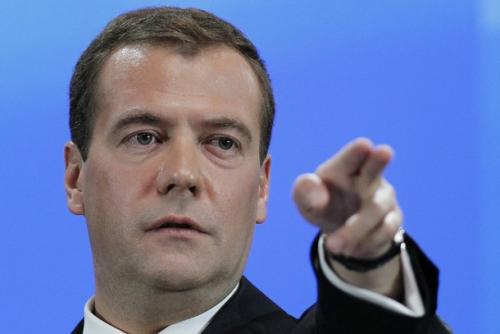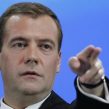
Medvedev’s Commitment to Partnership with the West Wears Thin
Publication: Eurasia Daily Monitor Volume: 8 Issue: 99
By:

The long press-conference that President Dmitry Medvedev held on May 18 was disappointing for every journalist and expert who had expected meaningful and substantive answers on the big questions that Russia is facing at this limbo-moment in the post-crisis-pre-crisis transition (Kommersant, Vedomosti, May 19; Nezavisimaya Gazeta, May 20). One package of his empty words that is in fact rather meaningful concerns Russia’s relations with the West. Medvedev can claim credit for building a working partnership with the US and the EU; instead, he merely pointed to “lessening of tensions with a number of states,” mentioning in this context Russia’s ability to defend its independence in the war with Georgia, which he elliptically called the “events of 2008.” The oddity of this interpretation aside, it is apparent that Medvedev has very little to contribute at the G8 summit this week in Deauville, France, where a face-to-face meeting with U.S. President Barack Obama is scheduled.
Traditionally, this select club focuses primarily on economic matters—and they indeed demand attention as instability inside the euro-zone continues, Japan’s economy hits dire straits, and the International Monetary Fund needs a new managing director. For Medvedev, however, the single most important issue is attracting foreign investors under the umbrella of “partnership for modernization,” which should not have been difficult given that price of oil has only slightly dropped to $110 per barrel. Instead, a steady outflow of capital from Russia continues, reaching the mark of $7.8 billion in April and $29.7 billion since the start of the year (www.gazeta.ru, May 20). Medvedev laments the investment climate but he cannot fail to see that investors have given him a no-confidence vote, and this failure underpins his retreat from expanding cooperation with the West.
A major global issue that the G8 would have to address is the turmoil in the Arab world and the deadlocked civil war in Libya; Medvedev would find himself in a minority of one in these discussions. He did not resort to colorful expressions at the press-conference but was on the same wave-length with Prime Minister Vladimir Putin, complaining that the UN Security Council Resolution 1973 was “manipulated,” which undermined the authority of the United Nations (RIA Novosti, May 18). Russia’s efforts at mediating a truce in the Libyan war are perhaps half-hearted, but its support to Syrian President Bashar Al-Assad is unwavering. Medvedev asserted that he would not allow a UN resolution authorizing sanctions against Syria to pass “even if my friends are going to beg me to” (Nezavisimaya Gazeta, May 20). It is clear that where President Obama sees a “historic opportunity” to advance democratic values, Medvedev and Putin are looking for opportunities to strengthen their rapport with distressed despotic rulers.
The issue that Medvedev has chosen as central in his forthcoming exchange with Obama is missile defense, and with all its strategic importance, there was no particular need to emphasize well-documented disagreements. Russian experts have good reasons to assume that the unity in NATO on this matter is hollow since the European member-states are not going to invest in anti-missile capabilities (Nezavisimaya Gazeta, May 20). Medvedev was probably informed that his initiative on a joint system in which Russia would own a wide sector was a smart diplomatic maneuver on the eve of NATO’s Lisbon summit, but is a non-starter in practical terms because Poland or Germany or Norway would not think about entrusting their defense to Russia. Yet, he declared that a failure to agree on “a model of cooperation in anti-missile defense” would result in “the kind of scenario that would throw us back into the Cold War era.”
Russia’s top brass have immediately produced a barrage of alarmist statements suggesting that by 2015, U.S. anti-missile assets, particularly if deployed in Poland, would constitute a direct threat to Russia’s deterrence potential (RIA Novosti, www.newsru.com, May 20). They are obviously excited by Medvedev’s words about “forcing the development of [Russia’s] nuclear strike potential,” but in fact there is very little that could possibly be done beyond the already over-stretched efforts. On Medvedev’s watch, a volume of new money has been poured into the old structures of military-industrial complex –only to prove that it cannot deliver on the ambitious orders. Medvedev has been firing generals by the dozen and has started sacking directors of plants and institutes, but his hysterics cannot make the Bulava missile any more reliable or the GLONASS satellite navigation system competitive with GPS (Nezavisimaya Gazeta, May 19). The chains of production that became obsolete in the autumnal years of the USSR cannot be miraculously modernized and are functioning as a colossal value-destruction mechanism with unusable output.
President Obama apparently wants to build on the achievements of his “reset” policy with Russia and is probably disappointed about Medvedev’s lack of interest in breaking the deadlocks in arms control, where the huge stockpiles of tactical nuclear weapons present a more demanding task than the non-existent missile defense (Nezavisimoye Voyennoye Obozreniye, May 20). Returns on the efforts aimed at securing Russian support in putting pressure on Iran, or state-reconstruction in Afghanistan, or re-launching the peace process in the Middle East are fast diminishing. The risk of degeneration of the uncertain partnership into an unfriendly coexistence in Europe is in fact pretty low because Russia has no capacity for engaging in a new Cold War and can only throw itself back into stagnant isolation.
Medvedev’s failure to sustain the cooperative momentum comes not from the feebleness of his pretense at leadership but from his organic belonging to Putin’s regime, which is seriously incompatible with Western institutions. Strong mercantilist and corrupt interests connect this quasi-democratic plutocracy with Europe and the United States, but acting on these interests (as Medvedev has earnestly tried) opens the country to “corrosive” influences. The Arab spring has awakened the basic instinct of regime self-preservation, and Medvedev has duly started back-pedaling, using the missile defense problem for steering the relationship into a crisis. Putin is entirely in his element in the atmosphere of bitter recriminations and petty quarrels, but Russia is drifting into a limbo it can ill afford.




